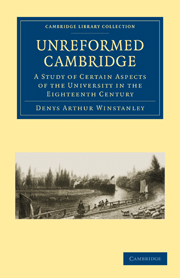CHAPTER I - THE CONSTITUTION OF THE UNIVERSITY
Published online by Cambridge University Press: 07 September 2010
Summary
The university of cambridge in the eighteenth century has been convicted of violating its statutes, misusing its endowments, and neglecting its obligations. It is impossible to dispute the substantial justice of this verdict, and to bring the condemned criminal again into the dock may well seem a piece of unnecessary cruelty. It doubtless would be if all that could be urged both for and against the University in that age had already been said, but this is not so. Little or no attempt has ever been made either to measure the extent of its shortcomings or to discover how they came to exist and to be tolerated. It has moreover been frequently forgotten that both scholarship and virtue, if not obtrusively present, were not completely absent. A fresh investigation may therefore not be an entire waste of time, but, as it must be detailed, it cannot but be tedious. Yet it may possibly serve a useful purpose if it succeeds in revealing a little more of the truth about Cambridge two hundred years ago.
The indispensable preliminary to such an undertaking is an enquiry into the constitution of the University in the eighteenth century, for so much of the administrative and legislative machinery, then in existence, has been obliterated or transformed by the successive waves of reform in the nineteenth and twentieth centuries, that few nowadays know how the University was once governed. Yet without such knowledge we cannot fairly judge our predecessors who in a measure were the victims of the constitution under which they lived.
- Type
- Chapter
- Information
- Unreformed CambridgeA Study of Certain Aspects of the University in the Eighteenth Century, pp. 1 - 38Publisher: Cambridge University PressPrint publication year: 2009First published in: 1935

